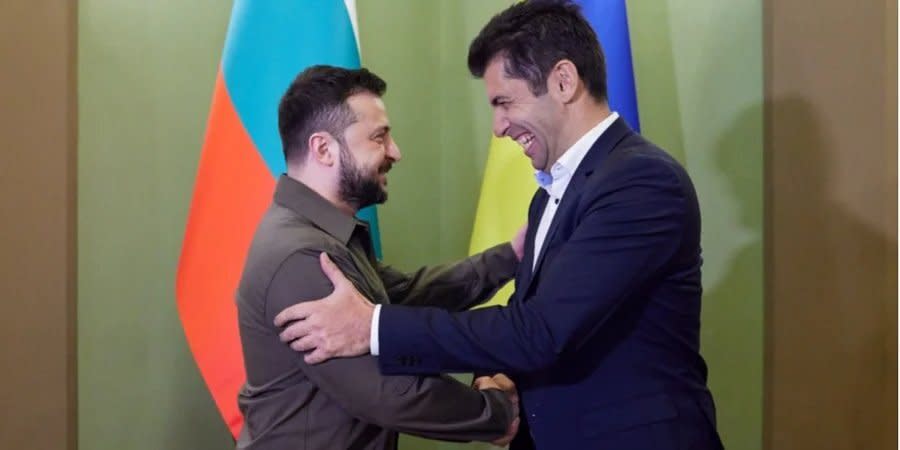Bulgaria secretly supported Ukraine in first six months of war, investigation shows

- Oops!Something went wrong.Please try again later.
- Oops!Something went wrong.Please try again later.
At the official level, Sofia did not announce the provision of military aid to the Ukrainian army.
Read also: Bulgaria greenlights first military aid package to Ukraine
According to the newspaper, when the then Prime Minister of Bulgaria Kiril Petkov visited Kyiv and met with Ukrainian President Volodymyr Zelenskyy on April 28, he had nothing to offer on providing military aid at the official level. The two politicians made a statement about agreements regarding the repair of Ukrainian military equipment in Bulgaria.
The Welt article states that, in fact, by this time, the Bulgarian government had already initiated the procedure for providing comprehensive military assistance to Ukraine.
In order to avoid the official supply of weaponry, ammunition and weapons were delivered to Ukraine through intermediaries.
In the period from April to August 2022, Bulgaria covered a third of the needs of the Armed Forces of Ukraine for ammunition, as well as providing up to 40% of the diesel fuel needed by the tanks and cars used by the Ukrainian army.
Interestingly, that during this period, Bulgaria processed only crude oil from Russia at its refinery.
“This is the story of a secret strategy to help Ukraine against all odds,” the investigation reads.
Read also: Bulgaria to send “serious” arms package to Ukraine
“The government of one of the poorest countries in the EU, which, as a former Eastern Bloc state, has long been considered an appendage of Moscow, has shown the courage to set an example for other countries: despite dependence on Russia and fears of (Russian dictator Vladimir) Putin’s aggression, there are creative ways to support Kyiv.”
In turn, Kyiv confirmed the fact that it had received secret military aid from Sofia.
“Kiril Petkov showed honesty, and I will always be grateful to him for using all his political skills to find a solution,” said Ukrainian Foreign Minister Dmytro Kuleba.
According to him, while some members of the Bulgarian coalition sided with Russia, Petkov “decided to be on the right side of history and help us defend ourselves against a much stronger enemy.”
The newspaper also notes that in the first days of Russia’s full-scale invasion of Ukraine, it was Petkov who called on the leaders of other EU countries, in particular French President Emmanuel Macron and German Chancellor Olaf Scholz, to support Ukraine and introduce tough sanctions against the Kremlin regime. The same position was followed by the then Minister of Finance of Bulgaria Asen Vasilev.
At a meeting of EU finance ministers in Paris, he gave a speech in which he did not talk about numbers and economic consequences. He explained what Russian dictator Vladimir Putin meant by statements about the “denazification of Ukraine.”
Read also: EU should stop Putin from paying for his war with an oil levy
“This is exactly what the Russians did in Bulgaria after World War II, they killed thousands of dissidents, professors and priests,” Vasilev said.
The newspaper also goes into more detail about how secret agreements were reached for the supply of munitions.
On April 19, Kuleba arrived in Sofia with the task of obtaining the necessary weapons.
“We knew that the Bulgarian warehouses had a large amount of ammunition we needed, so President Zelensky sent me on a diplomatic mission to get the necessary materials,” he said.
According to the Ukrainian minister, the negotiations took place behind closed doors, it was “a matter of life and death.”
Then Petkov replied that his internal political situation in his country is “difficult,” but he will do “his best.”
Petkov explained that his government had issued export licenses to intermediaries so that Ukraine could receive aid.
The April footage shows cargo planes loaded with ammunition flying between Bulgaria and Poland, where a large transshipment point was located 70 kilometers from the Ukrainian border.
“We made sure that the land route through Romania and Hungary was also open for trucks,” Petkov said.
“According to our estimates, about a third of the ammunition needed by the Ukrainian army in the early stages of the war came from Bulgaria.”
The journalists also managed to find out that all supplies for the Ukrainian army had been paid for by the United States and the United Kingdom.
Kuleba does not reveal all the details but confirms the procedure. He emphasizes that it is not about the fact that the Bulgarian government directly provided military aid to Ukraine, “but rather about the fact that Ukrainian companies and companies from NATO countries were given the opportunity to purchase what they needed from Bulgarian suppliers.”
As for the supply of diesel fuel, according to Vasilev, he encouraged the Bulgarian company Lukoil, which at that time was managed by a subsidiary of the Russian group, to export surplus oil to Ukraine. The reaction was positive, he said, and local workers also condemned Putin’s war.
“Trucks and tankers regularly went to Ukraine via Romania, and in some cases, fuel was also loaded into freight trains,” he said.
“Bulgaria became one of the largest exporters of diesel fuel to Ukraine, sometimes covering 40% of Ukraine’s needs.”
Read also: What Ukraine needs to win the war
In the summer of 2022, Bulgaria faced political changes and Petkov’s government was dismissed. But the government’s position on military aid to Ukraine did not change.
In December, the Bulgarian parliament decided to officially allow the supply of weapons to Ukraine.
On Nov. 3, the National Assembly of Bulgaria supported a resolution on the supply of military and technical aid to Ukraine.
The parliament passed it after just over a month.
The media reported that nine large U.S. aircraft like the Boeing C-17 will send weapons from Bulgaria to Ukraine. The list includes artillery guns, defense equipment, shells, and ammunition.
Read the original article on The New Voice of Ukraine

